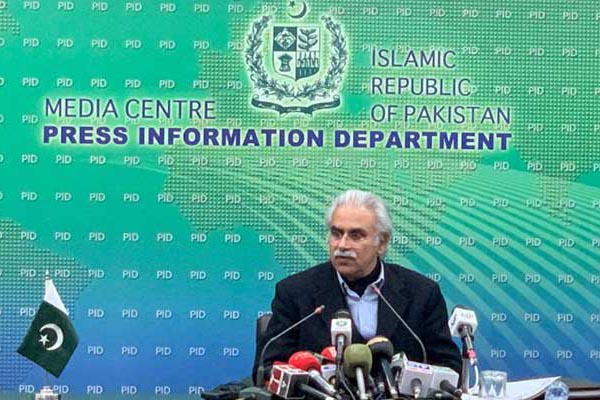
File photo. Courtesy PID
De facto health minister dismisses warnings from doctors, repeating government claims of it causing miseries for laborers
Dismissing calls of healthcare professionals from across Pakistan to enforce a complete lockdown in the country in a bid to curb the rapid rise in confirmed cases of coronavirus in the country, Special Assistant to the P.M. on Health Dr. Zafar Mirza on Sunday said it would only cause more misery for daily wagers and laborers.
Reiterating Prime Minister Imran Khan’s sole talking point for repeatedly acting against the advice of doctors on the front-lines of the fight against COVID-19, Mirza said the government was advocating social distancing—to mixed returns, as is visible daily on the streets of every urban center—and other precautionary measures instead of a strict lockdown. Even so, he said, this would only apply on areas where coronavirus patients had already been found to protect others of the area from infection.
According to Mirza, the federal government has provided thousands of addresses and names to the provinces to help them implement the “test, trace and quarantine (TTQ)” policy. “There is a need to focus more on locally transmitted cases when the share of locally transmitted cases has reached 81 percent. Provinces will track, trace and quarantine the contacts of the confirmed cases to slow the spread of the virus,” he said, adding this policy had been approved by the National Coordination Committee on COVID-19.
“It is a new policy under which the provincial governments, with the support of district administrations, will locate the contacts of the confirmed cases and will test them,” he said, warning the increased testing would lead to a manifold increase of confirmed coronavirus cases in the coming days.
The obvious gap in this policy is that if an area has not yet reported a case of the coronavirus—which is highly likely considering the high percentage of patients without any symptoms—by the time the government finds a case, it may already have spread far and wide.
To questions on doctors’ concerns about lack of personal protective equipment, the de facto health minister said the government would address all “genuine” grievances of healthcare professionals treating COVID-19 patients. He also dismissed a perception created by Pakistan Tehreek-e-Insaf spokesman Shahbaz Gill that doctors were acting at the behest of the ruling party’s political rivals, saying this was not true.
To another question, Mirza said the government had permitted congregational prayers in mosques—despite doctors urging the government to at least enforce a ban there—after consultation with ulema. He said precautionary steps were being taken for the safety and security of people visiting mosques to offer prayers.
While the ulema have no issue with people attending mosques for prayers—and risking their lives—they have all announced that they themselves would pray at home. Mufti Muneebur Rehman, who claimed the lockdown restrictions did not apply to mosques, and Religious Affairs Minister Noorul Haq Qadri have both said they would pray at home “for their safety.”
Dr. Mirza’s comments come as doctors from across Pakistan—Punjab, Sindh, Balochistan and Khyber-Pakhtunkhwa—have staged press conferences urging the government to not ease movement restrictions, warning the country’s healthcare infrastructure cannot support the spike that they fear is coming. A member of the Pakistan Medical Association in Lahore has said that the economy can recover; the dead cannot.
Pakistan currently has 13,328 confirmed COVID-19 cases, with 281 deaths and 3,029 recoveries.
